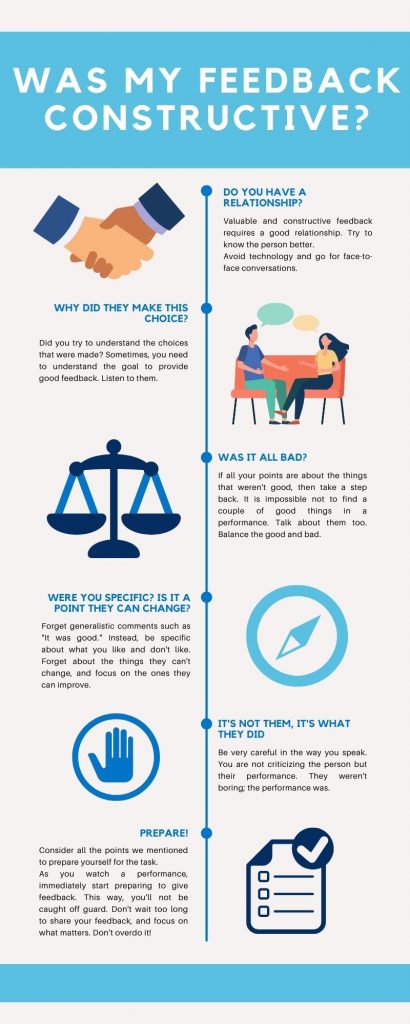Your cart is currently empty!
Feedback is vital to improve your work performance. The same is valid for public speaking – receiving good feedback is a huge help to improve your presentations. However, you may have a hard time getting constructive feedback.
When you want to help someone, telling them what they want to hear is hardly the way. Learning how to give constructive feedback helps others and yourself. People learn by example. If you give them helpful feedback, they’ll learn from you and hopefully do the same for you.
The Purpose of Giving Feedback
Constructive feedback has the goal of guiding and improving instead of criticizing. It is made to help others grow.
It is the best way to improve your results in a corporate environment. Constructive feedback makes the employees feel better and more confident. It also gives them new perspectives and insights – guides them. In addition, it makes people feel seen and appreciated, positively impacting them.
Constructive Feedback – the best way to go
If you want to give constructive feedback, there are a few points to which you need to pay attention. First, keep focusing on the purpose – elevate and improve.
Establish a relationship
How would you feel if a stranger had an opinion on your work? You must have a relationship with the person to give constructive and useful feedback.
It’s common for some people not to accept others’ feedback because they feel they have no idea who they are or what they do. This makes them defensive and suspicious. A good relationship is the first step to provide good feedback.
It is not all bad
Please don’t go for all the things they didn’t do right. Focus on the good things as well. The less positive are the first ones to catch our attention, but good feedback motivates. This way, try to balance positive and negative points and make sure you recognize their achievements.
Besides, think carefully about what’s really important to say – what’s necessary. Pure criticism is not helpful to anyone. If it is a detail that hasn’t had an impact on the performance, just leave it. Don’t even mention it unless the person asks specifically about it.
Listen
This may sound counter-intuitive, but you need to listen to the person you’re giving feedback to. First, allow them to explain their perspective. Then, you can provide more accurate and reliable input.
According to their explanation – assume nothing – point out opportunities and always try to start with what is working.
Focus on the specifics
“What did you think of my presentation?”
“I liked it. It was very good.”
This kind of feedback is merely a scrub for the ego, and it helps no one and says nothing. When giving your opinion, be as specific as possible about what was good and what was not so good. Details are essential to provide meaningful feedback.
Also, be very specific on what exactly you were criticizing. Did you not like what they said or how they said it? Only meaningful, clear feedback provides improvement.
Focus on what they can change
They can’t change their voice, can they? Focus on the tone then, on what they can improve and change to give a better performance. Criticizing someone for something that is out of their control is frustrating and doesn’t achieve anything.
When giving feedback, you must keep in mind your goal. What’s your intention in saying that? Does it hurt? Can the person do anything about it? Keep in mind that eventually, others will criticize you as well.
Provide recommendations for those points that can be changed. Work together on solutions that will benefit the performance.
It is not the time for tech
Forget phone calls or texting or any other form of communication that is not face-to-face. Giving feedback about others’ performance is a delicate task. It is time for authentic communication and connection. Everything matters – your tone, eye contact, and body language.
A face-to-face talk comes along as more important, personal, and respectful. It allows questions and deep and meaningful conversations about the discussed topics.
It’s not them, it’s what they did
You need to keep this in mind permanently, especially if you’re about to give some less positive feedback.
You aren’t criticizing them as people but a specific part of their performance. This must be clear for you, as well as for them. People will get defensive if they feel attacked or harshly criticized.
Discuss the behavior, the action, the sentence with the most specificity possible. Then, talk about why you think it’s not working, and suggest some action or alternative to improve it.
Don’t wait
Good feedback only have an impact when everything is fresh on both minds. Otherwise, you risk a reference getting lost or the feelings about the presentation changing in the middle term.
Don’t wait until tomorrow, the next meeting, or any other seemingly important situation. Instead, give your feedback as immediately as possible.
Don’t overdo it
You don’t need to scrutinize every single moment of the performance or give feedback at every opportunity. Instead, focus on what is essential and try to evaluate the mood and receptivity of the others.
You should prepare it
Giving feedback is a critical and challenging task from the communication point of view, so you should prepare for it. Take notes during others’ presentations and think of the best way of saying what you have to say. Your tone matters, remember?
Preparation helps you to avoid some forbidden expressions, such as “You’re wrong.”, “You don’t know what you’re talking about.” Or “That’s not how it’s done.” Sentences like these will ruin the relationship and, consequently, the communication path.
Good Feedback is respectful and objective
The person in front of you deserves respect and attention. When someone asks you to do something, and you agree, you should give your best. Feedback is vital for improvement and development, so focus on what matters the most.
Remember that you’re not criticizing, be positive, objective, and specific. Tell them what they can change and how. Focus on the goal – improvement.
Cátia is a psychologist who is passionate about helping children develop and train social skills.




Leave a Reply